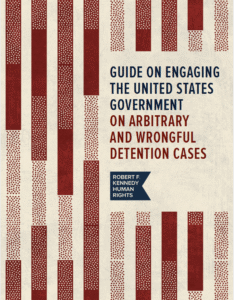On July 13, 2022, Robert F. Kennedy Human Rights, in partnership with Centre for Human Rights, University of Pretoria, Odhikar, the National Union of Institutions for Social Action Work (UNITAS), Kazakhstan International Bureau For Human Rights and Rule of Law (KIBHR), the International Service for Human Rights, Institute for Human Rights and Development in Africa (IHRDA), Centre for Human Rights and Democracy in Africa (CHRDA), and JOINT-Ligas de ONGs em Moçambique filed an amicus brief before the Inter-American Court of Human Rights in the case Tavares Pereira v. Brazil.
On January 1, 2004, the Inter-American Commission on Human Rights (IACHR) received a petition alleging the international responsibility of Brazil for the assassination of rural worker Antônio Tavares Pereira and the wounds sustained by 185 rural workers, allegedly committed by military police of the state of Paraná during the violent repression in the context of a protest for agrarian reform that was held on May 2, 2000.
The petition was submitted by the Landless Rural Workers’ Movement (Movimento dos Trabalhadores Rurais Sem Terra – MST), the Pastoral Land Commission (Comissão Pastoral da Terra – CPT), the Center for Global Justice (Centro de Justiça Global), and Land Rights (Terra de Direitos). On 29, 2009 the IACHR issued its admissibility report on the case, which was then referred to the Inter-American Court on February 19, 2021. The case represents an important opportunity to deepen and expand inter-American standards on freedom of expression and freedom of association, especially as it involves the Movimento dos Trabalhadores Sem Terra (MST), the largest workers’ movement in Latin America.
The MST was created as a result of a historical process, and the collective resistance of rural and marginalized communities (self-identified as Sem Terra) against the segregation, exclusion and exploitation that has historically characterized the life of rural communities in Brazil, and that deepened even more, following the development model of latifundia adopted in the country. The MST is the conduit that allows the individuals to translate their needs into demands, these demands are then recognized by the public power (due to social pressure, and collective strategies, for example, protests, demonstrations). These actions highlight a collective agency and a political agenda of vindication of rights, but also, a recognition of the legitimacy of the MST as a representative of these demands. Through this process emanates a civic and political identity and recognition. The Sem Terra, as members of the MST, go from occupying, in addition to the land, an immaterial political space.
The amicus brief focuses on the right to freedom of association. One of its main arguments is to highlight, by using Inter-American standards and international jurisprudence, that freedom of association is a right that should be recognized and guaranteed to MST’s members but also for the movement as a collective. The brief addresses the international and regional standards that protect the rights of collective organizations. Specifically: 1) the collective dimension of the right; 2) whether groups without legal personality- such as MST – to be recognized as an association without having to constitute itself as a “legal person” (akin to political parties and unions, even if some of their objectives overlap). The brief also covers standards related to protest and freedom of expression, and some specifically about the context of impunity and violence.
This brief outlines how MST’s right to be recognized as a victim and rights-holder should not stem from its formal constitution as a legal person. A restrictive interpretation as such would entail a blow to the right of freedom of association, which exercise should not depend on the legal personality of MST. Further, this would impose an organizational model that is alien to the collective identity and strategy of the Movement and the individuals that shape it, jeopardizing the work by a Movement that has been representing –for over three decades– historically excluded and vulnerable members of the population.
Therefore, this amicus brief seeks to invite the Court to assert the right to freedom of association of collectives, such as MST, that legitimately represents the interests and rights of historically marginalized communities. This is a prescient opportunity for this Court to further develop its jurisprudence on these matters and strengthen the protections for historically excluded and vulnerable communities and to reaffirm their collective representation in the form and shape that they judge fit to achieve the effective protection of their rights.
READ THE AMICUS BRIEF HERE [ENGLISH AND PORTUGUESE]




